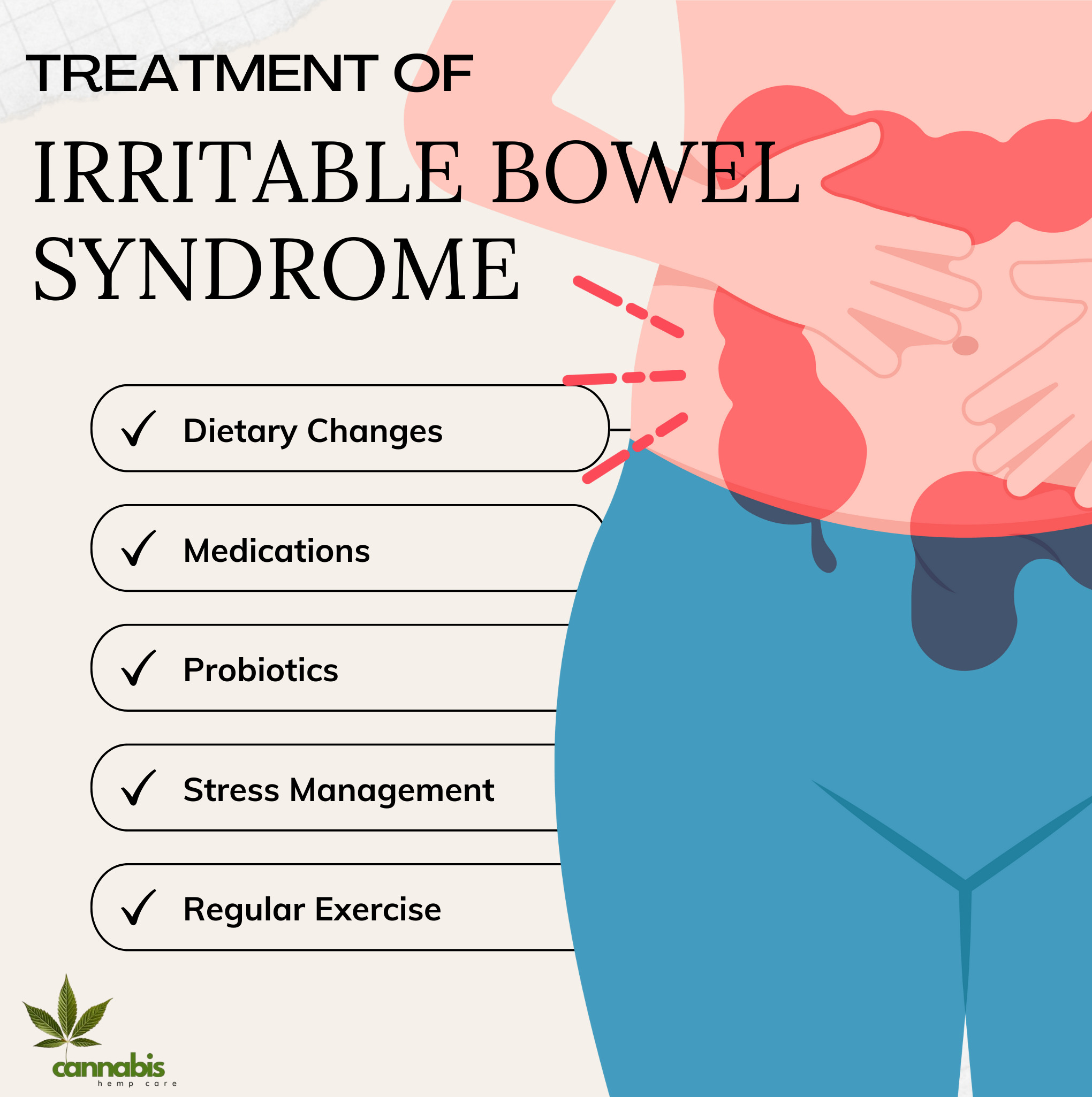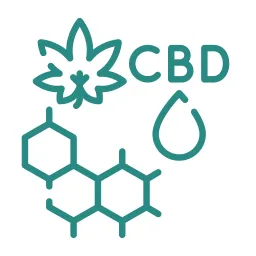Many people occasionally experience stomach discomfort after meals. But for some, this discomfort is a frequent occurrence, disrupting daily life.
If you’ve ever felt abdominal discomfort without a clear cause, Irritable Bowel Syndrome (IBS) might be the reason. Let’s explore it further, its causes, symptoms, and ways to manage it.
- What is Irritable Bowel Syndrome?
- Types of Irritable Bowel Syndrome
- Symptoms of Irritable Bowel Syndrome
- Causes of Irritable Bowel Syndrome
- Risk Factors of Irritable Bowel Syndrome
- Triggers of Irritable Bowel Syndrome
- Complications of Irritable Bowel Syndrome
- Treatment of Irritable Bowel Syndrome
- Prevention of Irritable Bowel Syndrome
- Diagnosis of Irritable Bowel Syndrome
- Final Thoughts
- FAQs
What is Irritable Bowel Syndrome?
Irritable Bowel Syndrome (IBS) is a gastrointestinal disorder1. It affects the large intestine and can cause belly pain, bloating, and changes in bowel habits, like going to the bathroom too much or not enough. It doesn’t damage the inside of the stomach or intestines but can be uncomfortable. If someone has these symptoms, they should see a doctor for advice.
Types of Irritable Bowel Syndrome
Irritable Bowel Syndrome (IBS) is not a one-size-fits-all condition. There are distinct subtypes of IBS, each characterized by specific bowel habits. Below is a comprehensive breakdown of these types.
IBS-D (Diarrhea-Predominant)
IBS-D is marked by frequent loose stools and sudden urges for bowel movements. Accompanying this is often abdominal pain, which can vary in intensity2.
IBS-C (Constipation-Predominant)
IBS-C patients experience infrequent bowel movements. Their stools tend to be hard or lumpy, and there’s often noticeable straining during defecation.
IBS-M (Mixed)
In IBS-M, patients alternate between diarrhea and constipation. Neither symptom predominates, making its management slightly more challenging.
IBS-U (Unsubtyped)
IBS-U individuals don’t consistently fit the criteria for IBS-D, IBS-C, or IBS-M. Their symptoms are irregular, but still discomforting.

Symptoms of Irritable Bowel Syndrome
Irritable Bowel Syndrome (IBS) is a disorder that impacts the large intestine. Here’s a closer look at its main symptoms.
Abdominal Pain
Irritable Bowel Syndrome often results in continuous or recurrent pain in the abdomen3. This pain usually decreases or fully disappears after a bowel movement. A study highlighted that over 70% of IBS patients report abdominal pain as a consistent symptom.
Bloating
Bloating refers to a feeling of increased pressure or fullness in the abdomen4. It’s often accompanied by visible abdominal distention. Approximately 60% of individuals with IBS experience regular bloating.
Diarrhea or Constipation (Sometimes Alternating)
Some IBS patients experience diarrhea, constipation, or both. IBS can be categorized based on these symptoms: IBS-D (diarrhea-predominant), IBS-C (constipation-predominant), or IBS-A (alternating). A study found that about one-third of IBS patients have IBS-D, one-third have IBS-C, and the remaining one-third experience an alternating pattern.
Mucus in the Stool
The presence of mucus in the stool is another noticeable symptom. This clear or white gel-like substance can often be seen in the stools of IBS sufferers. While mucus is naturally produced in the gut, Irritable Bowel Syndrome can lead to increased production, making it more visible.
Recognizing the symptoms of Irritable Bowel Syndrome is crucial for timely diagnosis and treatment. Anyone experiencing these symptoms consistently should consult a healthcare professional for guidance.
Causes of Irritable Bowel Syndrome
While the exact causes of Irritable Bowel Syndrome (IBS) remain unknown5, several factors have been identified that might play a role. This section delves into the leading hypotheses and observed triggers.
Brain-Gut Interactions
The communication between the brain and the intestines may malfunction, causing the body to overreact to normal digestive processes. This miscommunication can lead to pain, diarrhea, or constipation.
Intestinal Muscle Contractions
The muscles lining the intestines contract to move food through the digestive tract. If these contractions are stronger and last longer, they can lead to gas, bloating, and diarrhea. Weak contractions can slow food passage and lead to hard, dry stools.
Inflammation in the Intestines
Some people with Irritable Bowel Syndrome might have an increased number of immune-system cells in their intestines. This immune response is associated with pain and diarrhea.
Severe Infection
Irritable Bowel Syndrome can develop after a severe bout of diarrhea caused by bacteria or a virus. IBS might also be associated with a surplus of bacteria in the intestines.
Changes in Gut Microorganisms
The human body hosts beneficial microorganisms, including bacteria, fungi, and viruses. Changes in the balance of these microorganisms may play a role in the development of IBS6.
Though the exact cause of Irritable Bowel Syndrome remains elusive, understanding these potential triggers can provide insight into the condition’s management and treatment.

Risk Factors of Irritable Bowel Syndrome
While Irritable Bowel Syndrome (IBS) can affect anyone, certain factors increase its likelihood. This section outlines the primary risk factors linked to IBS.
Age
Younger individuals, especially those under 50, are more often diagnosed with Irritable Bowel Syndrome. However, it can occur at any age.
Gender
Women are statistically more likely to develop Irritable Bowel Syndrome. Researchers believe hormonal changes play a role, as many women find their symptoms worsening during or around their menstrual cycle.
Family History
Genetics might play a part. If family members have Irritable Bowel Syndrome, the chances of developing it are higher.
Mental Health Issues
Conditions such as anxiety, depression, or past physical or sexual abuse can heighten the risk of IBS. It’s believed that these factors might make someone more aware of changes in their body or exacerbate symptoms.
Gastrointestinal Infections
A history of gastrointestinal infections, especially severe occurrences, can increase the risk of Irritable Bowel Syndrome. Such infections might alter the gut flora or the way the gastrointestinal tract functions.
Being aware of these risk factors helps in understanding one’s susceptibility to IBS. It’s crucial to remember that while these factors can increase the likelihood of Irritable Bowel Syndrome, they don’t guarantee its onset. Regular check-ups and open communication with healthcare professionals can guide individuals in managing and understanding their risks.
Triggers of Irritable Bowel Syndrome
Irritable Bowel Syndrome (IBS) symptoms can vary from person to person, and certain factors can trigger or exacerbate these symptoms. Recognizing and understanding these triggers is crucial for effective management.
Foods
Certain foods might exacerbate Irritable Bowel Syndrome symptoms. Common culprits include:
- Fats
- Alcohol
- Chocolate
- Some dairy products
- Carbonated drinks
- Foods high in FODMAPs (fermentable oligo-, di-, mono-saccharides, and polyols)
Stress
While stress doesn’t cause Irritable Bowel Syndrome, it can trigger symptoms or make them worse7. Activities that help manage stress, such as meditation or exercise, can be beneficial in managing Irritable Bowel Syndrome.
Hormones
Women might experience more severe IBS symptoms during their menstrual cycle. This indicates that hormonal changes can play a role in triggering or intensifying symptoms.
Medications
Certain drugs, including antibiotics, antidepressants, and medicines containing sorbitol, might exacerbate IBS symptoms.
Other Illnesses
Conditions such as gastroenteritis or an overgrowth of bacteria in the intestines can trigger IBS symptoms. Additionally, other gastrointestinal disorders, like inflammatory bowel disease, can produce symptoms similar to IBS.
Understanding one’s triggers is foundational in managing IBS. By recognizing and possibly avoiding or adjusting these triggers, one can lead a more comfortable life.

Complications of Irritable Bowel Syndrome
Irritable Bowel Syndrome (IBS) is not just about discomfort. Over time, this condition can lead to complications, both physical and emotional. Here are some of the challenges faced by individuals with IBS.
Decreased Quality of Life
Constantly managing the symptoms of Irritable Bowel Syndrome, such as abdominal pain, bloating, and altered bowel habits, can lead to a diminished quality of life. Activities like dining out, traveling, or attending social events might become stressful or avoided altogether.
Poor Absorption of Nutrients
Chronic diarrhea can cause malabsorption, meaning the body might not effectively absorb essential nutrients from food. Over time, this can lead to deficiencies that affect overall health.
Mental Health Challenges
Irritable Bowel Syndrome can impact mental well-being. Individuals with IBS are more likely to experience anxiety or depression. The ongoing management of symptoms and the unpredictability of flare-ups can contribute to these mental health concerns.
Impacted Social Interactions
The need to be near a bathroom, or the fear of an unexpected symptom flare-up, can limit social interactions. This might lead to feelings of isolation or withdrawal from social engagements.
Sleep Disturbances
The discomfort and pain from Irritable Bowel Syndrome can disrupt sleep patterns. A lack of restful sleep can further exacerbate the symptoms of IBS and affect overall health and well-being.
The complications of IBS extend beyond digestive symptoms. Recognizing these potential challenges is essential for comprehensive care. By seeking timely medical advice and support, individuals can manage these complications and improve their quality of life.
Treatment of Irritable Bowel Syndrome
The management of Irritable Bowel Syndrome (IBS) is tailored to alleviate symptoms and improve the quality of life. While no cure exists for IBS, a range of treatments can help manage the condition effectively.
Dietary Changes
Monitoring and adjusting food intake is a primary approach. Common recommendations include:
- Limiting high-gas foods, such as carbonated drinks, and certain vegetables like cabbage or broccoli.
- Eliminating gluten to see if it alleviates symptoms.
- Following a low FODMAP diet reduces certain carbohydrates that can be difficult to digest8.
Medications
Depending on the symptoms, different medications may be prescribed:
- Fiber supplements for constipation.
- Laxatives to treat constipation.
- Anti-diarrheal medications.
- Antispasmodic agents to reduce abdominal cramping.
- Antibiotics, especially if bacterial overgrowth is suspected.
Probiotics
Probiotics are beneficial bacteria that can help restore the natural balance of gut bacteria. They might help alleviate some IBS symptoms, especially bloating.
Stress Management
As stress can exacerbate IBS symptoms, techniques such as:
- Cognitive Behavioral Therapy: This can help address the emotional challenges of IBS9.
- Relaxation Techniques: Meditation and deep-breathing exercises can reduce stress and potentially decrease symptom flare-ups.
Regular Exercise
Physical activity can help relieve depression and anxiety, alleviate constipation, and promote overall well-being, making it beneficial for some IBS sufferers.
Treatment for Irritable Bowel Syndrome is multifaceted, requiring a mix of lifestyle changes, medications, and sometimes therapy. Each individual’s needs can vary, so working closely with healthcare professionals ensures an effective and personalized treatment plan.

Prevention of Irritable Bowel Syndrome
Preventing the onset of Irritable Bowel Syndrome (IBS) is not always feasible due to its multifaceted causes. However, for those diagnosed with the condition, managing and preventing symptom flare-ups is vital. Here are several preventive measures that can help.
Mindful Eating
Eating slowly and ensuring thorough chewing can aid digestion and reduce the risk of IBS symptoms. Being conscious of portion sizes and avoiding overeating can also be beneficial.
Avoiding Trigger Foods
Through experience or a food diary, individuals can identify foods that exacerbate their IBS. Common culprits include dairy, high-fat foods, and certain carbohydrates. Once identified, it’s advisable to reduce or eliminate these foods.
Maintain a Balanced Diet
Incorporating fiber into the diet can be beneficial, especially for those with constipation. However, it’s essential to increase fiber intake gradually to avoid gas and bloating.
Manage Stress
Stress is a known trigger for IBS symptoms. Implementing stress-reducing activities like meditation, yoga, deep breathing exercises, or even regular walks can be effective in managing IBS.
Stay Hydrated
Drinking adequate water aids in digestion and can help alleviate constipation. It’s important to consume enough fluids, especially when increasing dietary fiber.
Regular Check-ups
Routine medical check-ups can help monitor the condition and adapt preventive measures accordingly. They also allow for early detection of any other potential gastrointestinal disorders.
While there’s no surefire way to prevent IBS, adopting these practices can minimize symptom flare-ups and enhance quality of life. An individual approach tailored to personal needs and regular consultation with healthcare professionals remains the cornerstone of effective IBS management.
Diagnosis of Irritable Bowel Syndrome
Diagnosing Irritable Bowel Syndrome (IBS) requires a careful and comprehensive evaluation due to its overlap with other gastrointestinal conditions. This section outlines the process and criteria typically used to diagnose IBS.
Medical History and Physical Examination
A doctor will begin by obtaining a detailed medical history, focusing on gastrointestinal symptoms, their duration, frequency, and any potential triggers. A physical examination will also be conducted to check for signs of other conditions.
Rome IV Criteria
Often used as a diagnostic tool, the Rome IV criteria specify that abdominal pain must be present at least one day per week in the last three months and be associated with two or more of the following:
- Related to defecation.
- Altered stool frequency.
- Altered stool form or appearance.
Exclusion of Other Disorders
To rule out other conditions, tests may be conducted, including:
- Blood tests to exclude celiac disease or other inflammations.
- Stool tests to check for infections or malabsorption issues.
- Colonoscopy or sigmoidoscopy to inspect the colon.
Lactose Intolerance Test
Since lactose intolerance symptoms can mimic those of Irritable Bowel Syndrome, a breath test might be administered to rule out this condition.
Food Allergy Tests
Some IBS symptoms can be due to food allergies. Specific tests can help pinpoint any allergies that might be causing or exacerbating symptoms.
A diagnosis of Irritable Bowel Syndrome often involves ruling out other potential causes for the presented symptoms. If you or someone you know is experiencing gastrointestinal issues, it’s crucial to consult with a healthcare professional for an accurate diagnosis and subsequent guidance on management.

Final Thoughts
Irritable Bowel Syndrome can impact daily activities, but understanding it can lead to better management. By learning its causes, symptoms, and treatments, one can make informed decisions about health.
Remember, proper knowledge and medical advice can make a significant difference for those living with IBS.
FAQs
Sources
- “Irritable Bowel Syndrome (IBS): Practice Essentials, Background, Pathophysiology.” EMedicine, 15 Feb. 2022, emedicine.medscape.com/article/180389-overview?form=fpf. Accessed 7 Oct. 2023. ↩︎
- Cleveland Clinic. “Irritable Bowel Syndrome: IBS, Symptoms, Causes, Treatment.” Cleveland Clinic, 24 Sept. 2020, my.clevelandclinic.org/health/diseases/4342-irritable-bowel-syndrome-ibs. Accessed 7 Oct. 2023. ↩︎
- “Irritable Bowel Syndrome (IBS).” Www.nhsinform.scot, www.nhsinform.scot/illnesses-and-conditions/stomach-liver-and-gastrointestinal-tract/irritable-bowel-syndrome-ibs. Accessed 7 Oct. 2023. ↩︎
- National Institute of Diabetes and Digestive and Kidney Diseases. “Symptoms & Causes of Irritable Bowel Syndrome | NIDDK.” National Institute of Diabetes and Digestive and Kidney Diseases, 12 Jan. 2020, www.niddk.nih.gov/health-information/digestive-diseases/irritable-bowel-syndrome/symptoms-causes. Accessed 7 Oct. 2023. ↩︎
- NHS. “Irritable Bowel Syndrome (IBS).” Nhs. uk, 24 Oct. 2017, www.nhs.uk/conditions/irritable-bowel-syndrome-ibs/#:~:text=Irritable%20bowel%20syndrome%20(IBS)%20is. Accessed 7 Oct. 2023. ↩︎
- Mayo Clinic. “Irritable Bowel Syndrome – Symptoms and Causes.” Mayo Clinic, 2 Nov. 2022, www.mayoclinic.org/diseases-conditions/irritable-bowel-syndrome/symptoms-causes/syc-20360016. Accessed 7 Oct. 2023. ↩︎
- Herndon, Jaime. “Everything You Want to Know about IBS.” Healthline, Healthline Media, 29 Sept. 2014, www.healthline.com/health/irritable-bowel-syndrome. Accessed 7 Oct. 2023. ↩︎
- National Institute of Diabetes and Digestive and Kidney Diseases. “Irritable Bowel Syndrome (IBS).” National Institute of Diabetes and Digestive and Kidney Diseases, 16 Jan. 2019, www.niddk.nih.gov/health-information/digestive-diseases/irritable-bowel-syndrome. Accessed 7 Oct. 2023. ↩︎
- “Irritable Bowel Syndrome | Womenshealth.gov.” Womenshealth.gov, 22 Feb. 2017, www.womenshealth.gov/a-z-topics/irritable-bowel-syndrome. Accessed 7 Oct. 2023. ↩︎




































